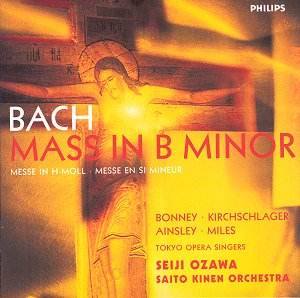Seiji Ozawa’s recording of Bach’s B Minor Mass is a
bit of an anomaly in today’s classical music landscape. Long dominated
by "modern" versions of Bach’s sacred vocal works, the trend,
in recent decades, has swayed toward "authentic" versions,
on period instruments, some with very small forces, such as those recordings
by Rifkin and Parrott, using one voice per part. But this recording
is part of a tradition of large-scale versions of such great sacred
works, and follows in the footsteps of the great recordings of Richter
and others.
It is interesting to compare this new recording to
another one at the opposite end of the spectrum. The last version of
the B Minor Mass I listened to was that of Andrew Parrott, using one
voice per part and very small forces. I have a personal preference for
an approach that leans in this direction (though, perhaps, not as extreme
as Parrott), but I also appreciate recordings that put the work on a
pedestal and focus on its grandeur.
And grandeur is indeed the underlying feeling one gets
from this new Ozawa recording. With a large chorus and orchestra, and
modern instruments, giving the work a big sound, this is the kind of
recording that will vibrate the very bones of the listener. And what
grandeur! Ozawa leads this with broad, emphatic strokes, putting emphasis
on the beat in the larger movements, and infusing the work with drive
and energy. While his tempi are "classical" - neither especially
slow nor particularly fast - the emphasis he gives adds élan
to the more rapid movements, and gives depth to the slower movements.
The sound of this recording is extraordinary: rich
and transparent. The choir has almost perfect texture and the soloists
ring out clear and pristine. Listen to the Christe eleison, a
duet for two sopranos, and the clarity of their voices. However, the
overall tone leans toward the bass range. While I generally listen to
CDs without changing the bass and treble settings, I found it more agreeable
to lower the bass one notch.
The sound of the obbligato violin in the Laudamus
te is a bit disappointing - the tone is slightly off at times, and
the instrument just doesn’t sound very nice. But Angelika Kirchschlager’s
singing of this work is admirable. A bit too much vibrato, as is often
the case in this type of performance, but she has a powerful voice that
is very moving.
Yet this movement betrays one of the weaknesses of
this recording. While Ozawa’s choice of recording this in a "big"
way is certainly justified, there is little contrast in tone between
the large choral movements and the more intimate arias, such as the
Laudamus te. This would be more effective with a bit less force,
a bit more sensitivity, letting the singer be subtler and allowing more
emotion to come through. As it is, she has to use all her force to balance
her voice with the orchestra.
But Ozawa excels in the big movements. The crescendos
of the Gratias agimus tibi are huge and organic, full of brute
energy and vigour. Yet the closing movement of the Mass, the Dona
nobis pacem, lacks the oomph of some of the other big movements.
The horns are a bit too present, and there is a distinct lack of crescendo
here.
The soloists give fine performances overall. John Mark
Ainsley is in very good form, especially in the Benedictus (with
flute obbligato, not violin obbligato as marked in the booklet). And
Angelika Kirchschlager in the Agnus Dei, makes this one of the
most moving parts of this work. Her voice complements this emotional
aria to perfection, and, here, the balance with the orchestra is exemplary.
This is the high point of the entire work.
With energy and drive at times, and with emotion at
others, this recording is a strong addition to the discography of this
great work. While there are some problems - the acoustic balance, a
lack of total conviction in the final movement - there is much pleasure
to be found. For those who don’t like historically informed performances
of Bach’s great vocal works, this is a commanding choice.
Kirk McElhearn


